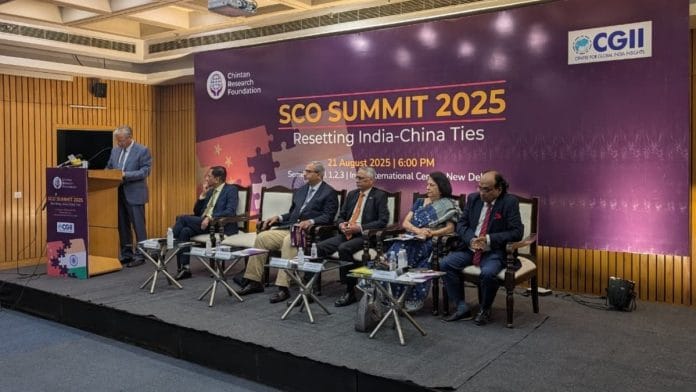New Delhi: Not only India, but Pakistan is also a “victim of terrorism,” said Chinese ambassador Xu Feihong Thursday, asserting that terrorist activities are the “enemy of the whole world”.
“In fact, terrorism is the enemy of the global world … So not only China and India but in fact Pakistan are also victims of terrorism. So what we should do now is a joint effort to fight against the terrorists and of course the most important thing is how to root out terrorism,” the Chinese envoy said, while speaking at the SCO Summit 2025 event organised by the Chintan Research Foundation (CRF) at the India International Centre here.
Pakistan and China have been key partners for decades, and Beijing has often defended Islamabad’s position at international fora.
In June 2023, China blocked a move by India and the US to designate the Pakistan-based Lashkar-e-Taiba (LeT) operative Sajid Mir as a global terrorist at the 1267 Al Qaeda Sanctions Committee of the United Nations Security Council (UNSC).
In October 2022, China had blocked another proposal by India and the US to designate Shahid Mehmood, deputy chief of a LeT proxy, and Talha Sayeed, the son of Hafiz Saeed (founder of the terrorist organisation) as global terrorists in the 1267 list. according to reports.
China is reported to have placed a hold on both the names on successive days. The LeT is the group behind the 26/11 Mumbai attacks as well as a spate of terror attacks across India.
While Beijing condemned the 22 April Pahalgam terror attack in J&K, which left 26 dead, it has remained silent on India’s position that the masterminds of the terrorist attack emanated from across the border in Pakistan.
India took a number of diplomatic measures against Islamabad following the Pahalgam terror attack including holding the Indus Waters Treaty of 1960 in abeyance. On 7 May, Indian armed forces launched Operation Sindoor, targeting terrorist complexes across Pakistan-occupied Jammu and Kashmir (PoJK) and Pakistan including in Bahawalpur and Muridke.
Pakistani military heavily uses Chinese weaponry. The differences in view on terrorism between India and China were also seen during the Shanghai Cooperation Organisation (SCO) defence ministers’ meeting in June.
The meeting did not conclude with a joint statement due to the lack of consensus between the defence ministers of member states. India had concerns over the language, which focused on both the Pahalgam attack and Jaffar Express attack, as reported by ThePrint.
The Indian leadership also raised the issue of terrorism during Chinese Foreign Minister Wang Yi’s visit to New Delhi earlier this week. Both National Security Adviser (NSA) Ajit Donal and External Affairs Minister S. Jaishankar broached the topic of terrorism during their bilateral meetings with Wang Yi.
Islamabad has borrowed over $60 billion from China under the China-Pakistan Economic Corridor (CPEC) announced over a decade ago.
India has objected to CPEC as it consists of infrastructure projects within PoJK. It has been one of the major reasons why New Delhi has also objected to Beijing’s Belt and Road Initiative (BRI).
However, Xu defended the BRI Thursday, calling it a key project to promote development across the interested countries.
The Chinese Ambassador to India further said that all countries ‘are welcome’ to participate in the $1 trillion infrastructure project.
(Edited by Amrtansh Arora)
Also Read: Silence & compromise will embolden the bully—Chinese envoy targets US over 50% tariff on India






